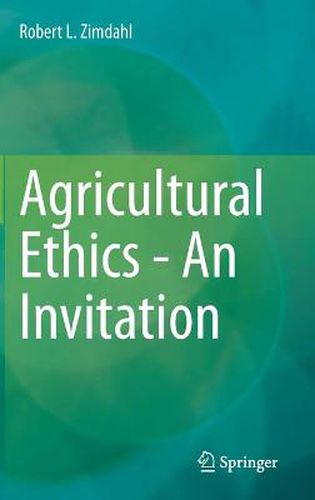Readings Newsletter
Become a Readings Member to make your shopping experience even easier.
Sign in or sign up for free!
You’re not far away from qualifying for FREE standard shipping within Australia
You’ve qualified for FREE standard shipping within Australia
The cart is loading…






This title is printed to order. This book may have been self-published. If so, we cannot guarantee the quality of the content. In the main most books will have gone through the editing process however some may not. We therefore suggest that you be aware of this before ordering this book. If in doubt check either the author or publisher’s details as we are unable to accept any returns unless they are faulty. Please contact us if you have any questions.
I write because I am concerned that I and my agricultural colleagues have avoided addressing the moral dimension of the environmental and social problems we have contributed to. I hope for an exchange of ideas about agriculture’s moral dilemmas. I encourage my readers to engage in a collective conversation about the dilemmas and avoid remaining in what Merton calls the collective arrogance and despair of his own herd. If those engaged in agriculture continue to ignore and fail to realize our common difficulties they will be addressed and resolved by societal pressure and political action, which may not yield the resolution we favor. The book’s goal is not to resolve the moral dilemmas raised. It is to raise them and encourage thought and discussion. It will ask but not answer why nearly all involved in agriculture have not addressed the moral concerns voiced by the general public. The agricultural enterprise is committed to the benefits and future success of the present, very productive, chemical, capital, and energy intensive system, which is, in the minds of many, not sustainable. The internal justification invokes the moral claim that they feed the world’s population. The question remains whether or not the prevailing moral justification of feeding the world is adequate given all the issues modern, developed country agriculture faces: pesticides in soil, water, and food, cruelty to animals, Biotech/GMO’s, corporate agriculture, pollution by animal factory waste, exploitation of and cruelty to migrant labor.
$9.00 standard shipping within Australia
FREE standard shipping within Australia for orders over $100.00
Express & International shipping calculated at checkout
This title is printed to order. This book may have been self-published. If so, we cannot guarantee the quality of the content. In the main most books will have gone through the editing process however some may not. We therefore suggest that you be aware of this before ordering this book. If in doubt check either the author or publisher’s details as we are unable to accept any returns unless they are faulty. Please contact us if you have any questions.
I write because I am concerned that I and my agricultural colleagues have avoided addressing the moral dimension of the environmental and social problems we have contributed to. I hope for an exchange of ideas about agriculture’s moral dilemmas. I encourage my readers to engage in a collective conversation about the dilemmas and avoid remaining in what Merton calls the collective arrogance and despair of his own herd. If those engaged in agriculture continue to ignore and fail to realize our common difficulties they will be addressed and resolved by societal pressure and political action, which may not yield the resolution we favor. The book’s goal is not to resolve the moral dilemmas raised. It is to raise them and encourage thought and discussion. It will ask but not answer why nearly all involved in agriculture have not addressed the moral concerns voiced by the general public. The agricultural enterprise is committed to the benefits and future success of the present, very productive, chemical, capital, and energy intensive system, which is, in the minds of many, not sustainable. The internal justification invokes the moral claim that they feed the world’s population. The question remains whether or not the prevailing moral justification of feeding the world is adequate given all the issues modern, developed country agriculture faces: pesticides in soil, water, and food, cruelty to animals, Biotech/GMO’s, corporate agriculture, pollution by animal factory waste, exploitation of and cruelty to migrant labor.